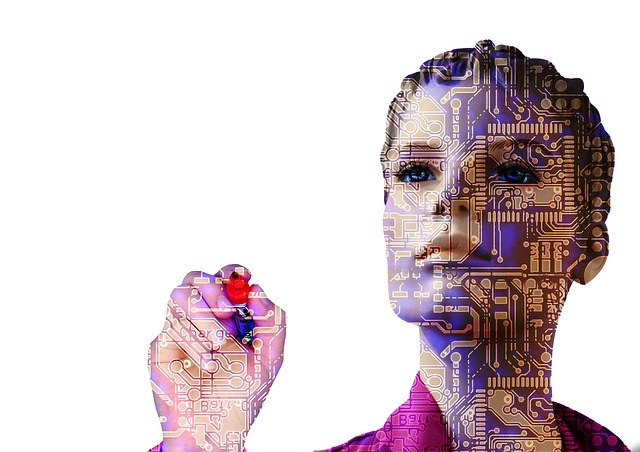Exploring the Intersection of Artificial Intelligence and Software Development
The term artificial intelligence (AI) refers to the simulation of human intellect in machines that are capable of carrying out operations that ordinarily call for human cognitive skills like learning, reasoning, perception, and decision-making. AI has become a potent tool in software development for automating repetitive tasks, boosting productivity, and enhancing the general quality of the software.
Large data sets can be analyzed, patterns can be found, and predictions can be made that would be challenging for humans to do in a timely and accurate way. The use of AI in computer software generation helps to guarantee better code quality, increase process efficiency, and improve the user experience. As software gets more complicated and demand for software developers keeps rising, AI’s role in software development is becoming more significant.
Over the past few years, artificial intelligence (AI) has had a growing effect on software development. We will examine how AI impacts software development in this piece. We’ll start by outlining what artificial intelligence is and how it applies to the creation of software. The benefits and drawbacks of AI in software creation will then be covered.
This will include the advantages of AI, such as increased effectiveness and productivity, better decision-making, enhanced code quality and security, and predictive maintenance. We’ll also look into the possible costs, reliance on AI algorithms, and lack of human touch associated with AI in software development.
Moving on, we will look at some real-world applications of AI in software development. This will include how AI is used in agile development, testing and debugging, code optimization and analysis, and user experience and feedback. Additionally, we will explore the future of AI and software development. This will cover the challenges and opportunities that AI presents, ethical concerns and regulations, and the emergence of AI-powered development platforms.
Advantages

Productive and Efficient
AI makes software development more efficient and productive in several ways:
- Automating Repetitive Tasks: AI can automate repetitive tasks such as testing, deployment, and code review. By automating these tasks, developers can focus on more critical tasks, such as designing and implementing new features.
- Optimizing Workflows: AI can analyze data and provide insights that can help software developers optimize their workflows. By identifying bottlenecks and inefficiencies, developers can streamline their processes and improve their efficiency.
- Enhancing Collaboration: AI can facilitate collaboration among team members by providing a centralized platform for communication, task management, and project tracking. This can improve productivity and reduce the time required for project completion.
- Predictive Maintenance: AI can be used to predict potential issues and prevent them from occurring. This can help reduce downtime and maintenance costs and ensure that software is running at peak performance.
Overall, AI can make software development more productive by automating repetitive chores, streamlining workflows, fostering collaboration, and identifying problems early on. This enhanced productivity and efficiency can result in quicker software delivery, lower expenses, and higher customer satisfaction.
Improved Code Quality and Security

The use of AI in software creation can result in more secure and high-quality code. AI can examine code to find bugs, vulnerabilities, and possible speed bottlenecks, enabling developers to address these issues before they become more serious issues. Automated testing can be used to test code more thoroughly and quickly, which can help find problems that human testing might have missed and raise the overall quality of the code.
AI can also assist developers in improving their code by spotting areas that can be refactored to enhance performance or simplify it, making it simpler to maintain and work with over time. AI can also be used to identify security risks such as malware, phishing attacks, and other cyber threats, allowing software makers to take precautions to reduce these risks and guarantee the security of their products. Overall, applying AI to software development can enhance code security and quality, lowering the probability of errors and flaws that could negatively affect end users’ experience.
Better Decision Making and Predictive Maintenance
Better decision-making and proactive upkeep in software development can both benefit from AI. AI is capable of analyzing vast quantities of data from numerous sources to find trends and insights that can be useful when making decisions. This can aid devs in making wise choices regarding things like user experience, product design, and feature development. Another place where AI can help developers is predictive maintenance.
By analyzing data from sensors in devices or systems, AI can predict when a component is likely to fail and notify the maintenance team to take preventative action. AI can also optimize software performance by analyzing data and identifying areas that can be improved. This can lead to faster load times, better response times, and a smoother overall user experience.
Additionally, AI can help software developers create personalized experiences for users by analyzing user data and identifying patterns and preferences. This can help developers tailor the software to the specific needs and preferences of individual users.
Automating Tedious Tasks
Automating tedious and repetitive duties is one of the most important advantages of using AI in software development. Here are a few instances:
- Code Generation: AI can generate code based on specific requirements and templates, reducing the time and effort required for developers to write code from scratch.
- Bug fixes: AI can automatically identify and fix common bugs and issues, freeing up developers to focus on more complex and specific tasks.
- Documentation: AI can create software documentation automatically, saving time and effort compared to manually writing and updating documentation.
- Testing: AI can automate testing, allowing programmers to quickly and thoroughly test their code. This can enhance overall code quality and help find problems that manual testing might have overlooked.
Developers can concentrate on more complex and imaginative tasks, such as creating new features, enhancing the user experience, and resolving more difficult problems, by automating these tedious and time-consuming duties. This may result in higher output, a shorter time to market, and better program quality.
Disadvantages

Costly
One drawback of using AI in software creation is that it is “expensive.” It can be expensive to implement and manage AI systems, particularly for small and medium-sized businesses. AI algorithm development and training require specialist knowledge and equipment, such as data scientists and high-performance computing facilities.
Smaller businesses may find it difficult to integrate AI into their software development procedures as a result. In addition, the price of the tools and software needed for AI can be high. However, long-term investment costs may be outweighed by possible advantages of AI, such as higher productivity, better code quality, and customized user experiences. Before incorporating artificial intelligence in the development of software, companies must carefully weigh the cost-benefit analysis.
Dependence on AI algorithms
Using AI could have some drawbacks, one of which is becoming overly reliant on AI algorithms and not utilizing human intelligence. This dependence may be an issue if the AI algorithm is flawed or if incomplete or biased data causes it to generate inaccurate results. If the AI algorithm generates inaccurate results, developers may start to rely too much on it when making choices.
Another problem is the opaqueness of artificial intelligence programs, which can make it difficult for developers to comprehend how choices are made. Developers may find it challenging to fix and improve the AI algorithm as a result of this lack of transparency, which could increase reliance on the algorithm.
Developers must be conscious of the limitations of AI algorithms and use them as a tool rather than as a replacement for human judgment in order to reduce this risk. Additionally, developers ought to confirm that the artificial intelligence algorithm is generating truthful and impartial outcomes by validating its output.
Additionally, developers should make sure that the AI algorithms they employ are transparent by understanding how the algorithms decide what to do and, when appropriate, explaining those choices to users.
Lack of Human Touch
The lack of a human touch when using AI in software development is another possible drawback. AI’s ability to be imaginative or compassionate may be constrained because it is built to evaluate data and optimize based on patterns. This can be a problem in fields like customer support or user experience, where human interaction is crucial.
For example, chatbots are commonly used in customer service to handle basic queries and support. While chatbots can be useful, they lack the empathy and personal touch that a human agent can provide. This can lead to frustration and dissatisfaction among customers.
To mitigate this issue, developers should carefully consider where AI can be used most effectively and where a human touch is essential.
In areas where human interaction is necessary, developers should ensure that artificial intelligence is used as a tool to support human agents rather than as a replacement for them. Additionally, developers can use AI to analyze data and provide personalized recommendations, but human agents should be available to provide more personalized and empathetic support where necessary.
Real-World Applications

AI is being applied in many different ways to enhance software development procedures and produce cutting-edge software. Here are a few examples of real-world uses for AI in software development:
- Code Generation and Optimization: Developers can produce more effective and efficient software by using AI to build and optimize code. Artificial intelligence, for instance, can be used to create code from descriptions in natural human language, eliminating the need for manual coding.
- Testing and Debugging: AI is being used to handle testing and debugging, enabling developers to find problems earlier and solve them. AI can evaluate code and find bugs, allowing developers to concentrate more on fixing problems rather than looking for them.
- Natural Language Processing: Software applications are using AI to enhance natural language processing (different from speech recognition), giving users more intuitive methods to interact with the software. AI can be used, for instance, to teach chatbots to comprehend questions posed in natural language and respond appropriately.
- Personalization: By adapting to unique user tastes and behaviors, artificial intelligence is being used to personalize software experiences for users. For instance, based on a user’s browsing past or purchasing patterns, recommendation engines can be used to make recommendations for goods or content.
- Predictive Maintenance: In order to anticipate maintenance requirements and avoid machine failures, AI is being used, which lowers maintenance costs and downtime. AI, for instance, can analyze information from sensors and other sources to spot possible problems before they become serious ones.
These are just a few instances of how artificial intelligence is being applied to software development. Future software development will probably see even more creative uses of AI as the field of artificial intelligence develops.
The Future of Software Development with AI

Challenges and Opportunities
While AI offers many potential benefits to software development, there are also challenges that need to be addressed. Here are some challenges and opportunities of AI in software development:
- Data Quality and Bias: Artificial intelligence relies on data to learn and make decisions, so data quality and bias are important considerations. Poor quality data can result in inaccurate predictions or flawed decision-making, while biased data can perpetuate discrimination or inequality. Opportunities exist to improve data quality and mitigate bias through better data collection and analysis techniques.
- Skills and Knowledge: Developing and implementing AI applications require specialized skills and knowledge, including expertise in machine learning, data science, and software development. Opportunities exist to address skills gaps and provide training and education for developers and other stakeholders.
- Ethical Considerations: As with any technology, AI raises ethical considerations, including privacy, security, and accountability. Opportunities exist to develop ethical frameworks and guidelines for the responsible development and use of AI in software development.
- Integration with Existing Processes: Integrating AI into existing software development processes can be challenging, as it requires changes to workflows, tools, and team structures. Opportunities exist to develop best practices and guidelines for integrating AI into software development processes.
- Innovation and Creativity: While artificial intelligence can automate many routine tasks in software development, it is important to maintain space for innovation and creativity. Opportunities exist to leverage AI to free up time and resources for more strategic and creative work.
Overall, the challenges and opportunities of AI in software development are closely intertwined. By addressing challenges such as data quality and ethical considerations, we can unlock the full potential of AI to create more efficient, effective, and user-friendly software products.
Ethical Concerns and Regulations
The application of artificial intelligence to the creation of software highlights ethical issues related to bias, privacy, security, accountability, and societal effects. Regulations and guidelines have been created to handle these issues, such as the General Data Protection Regulation of the European Union and the principles of the IEEE Global Initiative on Ethics of Autonomous and Intelligent Systems.
To make sure that AI systems are created and utilized in a responsible and ethical way, developers must adopt a proactive stance. They must recognize and reduce bias, protect data privacy and security, encourage accountability and transparency, and take into consideration how AI systems will affect society as a whole.
Developers can contribute to ensuring that the advantages of AI in software development are realized in a responsible and sustainable manner by adhering to rules and guidelines and maintaining open communication with stakeholders.
The Emergence of AI-Powered Development Platforms
A novel trend in software development is the use of AI-powered development platforms. These systems use deep learning and machine learning to provide insights and suggestions to developers as well as automate processes like coding, testing, and deployment. This can considerably boost output and efficiency, lessen mistakes and bugs, and raise the caliber of software development as a whole.
One example of an AI-powered development platform is OpenAI’s Codex, which uses natural language processing to understand developer inputs and generate code in real time. Another example is DeepCode, which uses machine learning algorithms to analyze code and identify potential errors and security vulnerabilities.
As AI-powered development platforms continue to evolve and improve, they have the potential to revolutionize software development by enabling developers to work more efficiently and effectively. However, as with any new technology, there are also potential challenges and ethical considerations to consider.
It is important for developers and stakeholders to stay informed and engaged in the development and use of AI-powered development platforms to ensure that they are used responsibly and ethically.
If Nothing Else, Remember This…
Key Points
This article explored the impact of artificial intelligence on software development, highlighting both advantages and disadvantages. The key takeaways include:
Advantages:
- Increased efficiency and productivity through automation and optimization of software development processes.
- Improved code quality and security through the use of machine learning algorithms to identify and mitigate potential errors and vulnerabilities.
- Better decision-making and predictive maintenance through the analysis of data and the use of predictive models.
- Automation of tedious tasks, freeing up developers to focus on more creative and complex tasks.
Disadvantages:
- Increased costs associated with implementing AI technologies.
- Dependence on AI algorithms can lead to potential errors and biases.
- Lack of human touch and the potential for a decrease in human involvement in software development.
Real-world applications of AI in software development include Agile development, DevOps, and AI-powered development platforms.
Both opportunities and challenges are presented by the use of AI in software creation in the future. Regulations and ethical issues need to be taken into account, and AI-powered development tools could completely change the way that business is done.
Overall, applying AI to software development has the potential to greatly increase effectiveness, output, and product quality; however, it is crucial to take into account any potential risks and make sure that AI technologies are applied properly and ethically.
Final Thoughts
As AI continues to advance and evolve, its impact on software development will only become more significant. While there are certainly challenges and ethical concerns to consider, the potential benefits of AI in software development are substantial.
As developers and stakeholders, it is important to stay informed about the latest AI technologies and their applications, to ensure that they are used in a responsible and ethical manner. By embracing the opportunities that AI presents while also remaining mindful of the challenges, we can work towards a future where AI and software development work hand in hand to create innovative and impactful solutions.




